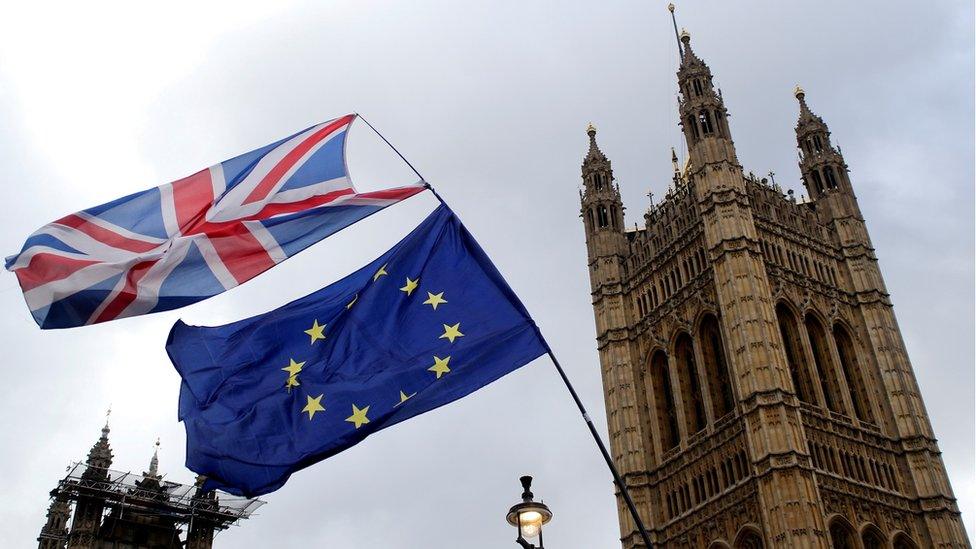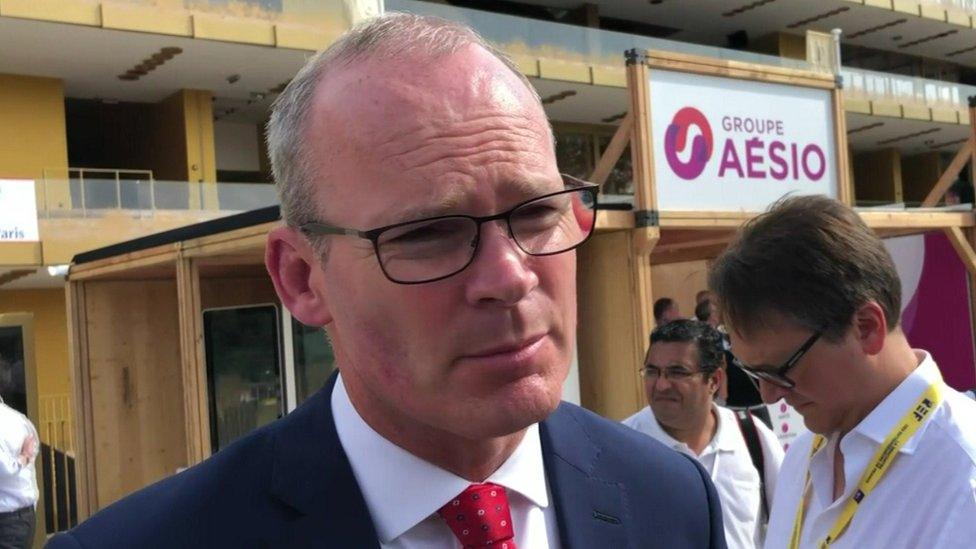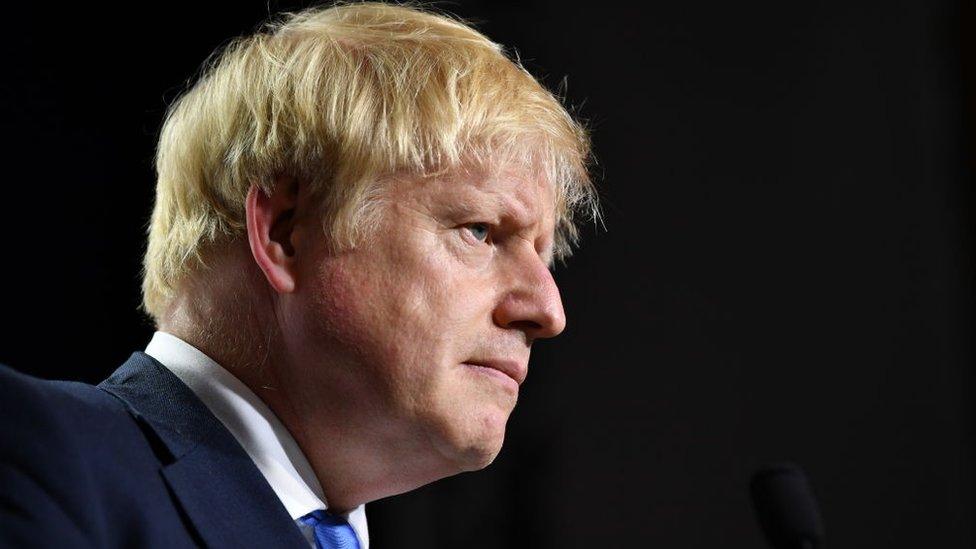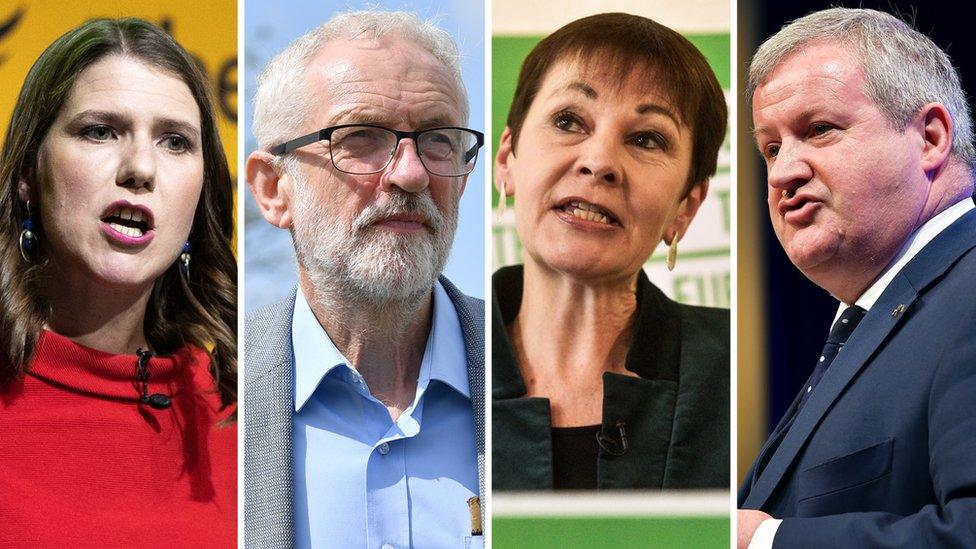Parliament suspension 'callous political play'
- Published
- comments

The UK is due to leave the EU on 31 October, with or without a deal
The government's move to suspend Parliament has been criticised by Sinn Féin, the SDLP, the Ulster Unionists and the Alliance Party.
But Democratic Unionist Party (DUP) leader Arlene Foster welcomed the move.
It emerged on Wednesday that the government would ask the Queen to suspend Parliament in September.
That will make way for Boris Johnson's new administration to hold a Queen's Speech - laying out the government's plans - on 14 October.
On Tuesday, opposition parties at Westminster agreed to work together to avoid a no-deal Brexit on 31 October.
If Parliament is suspended, MPs are unlikely to have time to pass any laws that could stop the prime minister taking the UK out of the EU without a deal.
Sinn Féin has described the move to suspend Parliament as a "callous political play".
Conor Murphy, one of the party's senior MLAs, said it meant a no-deal Brexit is now the most likely outcome and that Irish interests were not being protected.
Mr Murphy said the prime minister's move was not aimed in any way at helping restore Stormont and said the DUP was "foolish" for backing Mr Johnson.
SDLP leader Colum Eastwood said the move was "disgraceful" and "anti-democratic".
In a letter to all MPs, urging them to support a motion of no confidence in the prime minister, he said Mr Johnson "doesn't care" about the "fragile complexities that underpin peace and prosperity in Northern Ireland".
Allow X content?
This article contains content provided by X. We ask for your permission before anything is loaded, as they may be using cookies and other technologies. You may want to read X’s cookie policy, external and privacy policy, external before accepting. To view this content choose ‘accept and continue’.
Tánaiste Simon Coveney said the British government "seems to be simply wiping the slate clean on the Irish issue".
He said: "We can never sign an agreement with that approach so we've always said that if there is a no-deal Brexit, it will be the choice of a British prime minister and a British parliament.
"We spent many months putting together a withdrawal agreement which was a compromise on both sides, in order to get a fair deal for the UK and the EU.

Simon Coveney was speaking outside a conference in Paris on Wednesday
"It protected the peace process on the island of Ireland and allowed the Republic of Ireland to stay in the EU single market while preventing physical border infrastructure re-emerging on the island of Ireland, which was a source of such tension in the past."
But DUP leader Arlene Foster welcomed the decision to hold a Queen's Speech.
The confidence-and-supply agreement her party struck in 2017 to support the Conservatives would be reviewed in advance of the new Parliament session, she said.
"The new session of Parliament will set a new domestic legislative programme which can deal with the matters most important to people such as their safety, their schools and their hospitals," she added.
"In the meantime, we will continue our work with the prime minister to strengthen the union, deliver a sensible deal as we exit the EU and restore devolution in Northern Ireland."
'A good day for democracy'
TUV leader Jim Allister said it is "time to get on with getting out".
He added: "Three years on, the patience of the people has been exhausted.
"Today's news would appear to bring us closer to implementing the will of the people. Assuming it plays out like that, today will be remembered as a good day for democracy."
Allow X content?
This article contains content provided by X. We ask for your permission before anything is loaded, as they may be using cookies and other technologies. You may want to read X’s cookie policy, external and privacy policy, external before accepting. To view this content choose ‘accept and continue’.
However, the MEP Naomi Long, the leader of the Alliance Party, said parliamentary democracy was being "sacrificed on the altar of Brexit".
She criticised the DUP for "giving cover to this parliamentary coup".
The Ulster Unionist leader, Robin Swann, called the suspension of Parliament an "abuse of process".
"Every piece of legislation that was in process has now fallen. There is no opportunity now for MPs to come back with any serious time for meaningful debate and challenge.
"I think it leaves Northern Ireland very much on the sideline."

Analysis: Jayne McCormack, BBC News NI political reporter
This was more than a bolt from the blue.
It was a hard-hitting serve, back across the court toward opposition MPs who want to block a no-deal Brexit.
Already there's been an angry reaction from some of the Stormont parties, who don't buy the government's argument that this is simply about "getting on" with the domestic agenda.
A lot remains unclear about the coming days but one thing is certain: talks to restore Stormont before the Brexit deadline are bound to fade further into the background.

In a letter to MPs on Wednesday, Mr Johnson confirmed his government's intention to end Parliament's current session on 10 September in preparation for a Queen's Speech.
The letter also mentions the Northern Ireland (Executive Formation and Exercise of Functions) Act, which includes a provision that the government must regularly debate reports on progress to restore Stormont.
Mr Johnson confirmed that MPs would hold the first of those debates on 9 September, one day before he wants Parliament to be suspended.
It would not need to debate another report until after Parliament returned on 14 October.
MPs had originally backed that provision being added to the Northern Ireland Act to make it harder for the government to prorogue Parliament but the dates specified in the act coincide with the government's timetable for prorogation.
- Published28 August 2019

- Published27 August 2019
